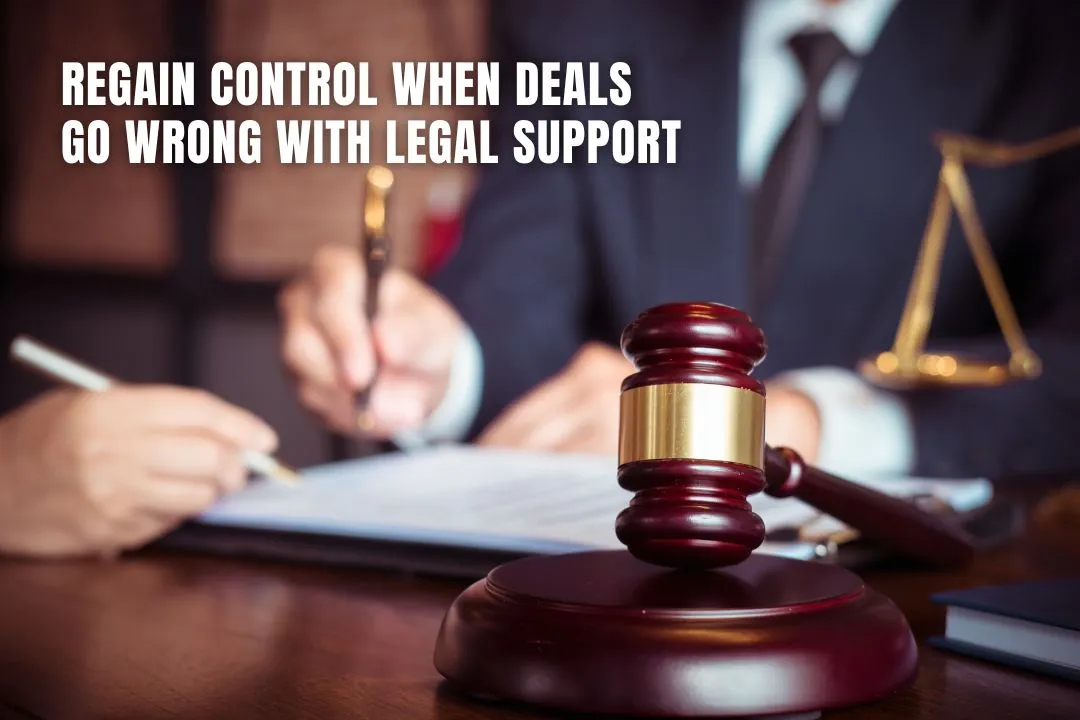
Editorial Disclaimer
This content is published for general information and editorial purposes only. It does not constitute financial, investment, or legal advice, nor should it be relied upon as such. Any mention of companies, platforms, or services does not imply endorsement or recommendation. We are not affiliated with, nor do we accept responsibility for, any third-party entities referenced. Financial markets and company circumstances can change rapidly. Readers should perform their own independent research and seek professional advice before making any financial or investment decisions.
Running a business is full of negotiations, handshakes, and bold leaps of faith. But even when everything looks good on paper, things can go off-script—fast. A key supplier suddenly breaches contract. A customer won’t pay. A former partner turns combative. One moment, you’re chasing growth; the next, you're chasing unpaid invoices.
For many business owners in Australia, legal disputes aren’t just frustrating—they’re exhausting, expensive, and distracting. That’s where a commercial litigation lawyer becomes more than just legal backup. They become your stabiliser in stormy waters.
Let’s unpack how getting the right legal support early can save your sanity (and your bottom line), and what to expect if you’re currently dealing with a business dispute that’s spiralling out of control.
Most business owners aren’t reckless. You review contracts. You pay on time. You build relationships in good faith. And yet, disputes still creep in. Why?
Because business involves people—and people are unpredictable. Common causes include:
These kinds of issues can hit startups and seasoned enterprises alike. And they don’t always start with malice—sometimes it's just bad communication, unclear terms, or shifting business priorities.
But here’s the kicker: waiting too long to act usually makes things worse.
You don’t need to wait until someone’s threatening court to get help. In fact, the earlier you bring in a commercial litigation lawyer, the more options you have. They can help you:
In many cases, just having a lawyer on board shifts the dynamic. It signals that you’re taking the issue seriously and aren’t bluffing. That alone can bring stubborn parties to the table.
Let’s say your dispute does escalate. What does the process actually look like?
The lawyer will assess your situation, review relevant documents, and let you know where you stand. They’ll explain your options and likelihood of success under Australian law. This part is critical—sometimes walking away is cheaper than “winning.”
Most lawyers will start by trying to resolve the matter informally. This might involve:
These steps often resolve things without needing court.
If the dispute can’t be resolved, it moves to litigation. Your lawyer will:
Keep in mind—litigation can take months or even years, depending on complexity. That’s why early intervention matters.
Let’s be honest—legal services aren’t cheap. But the real question is: what is the cost of not getting help?
Unresolved disputes can:
A good commercial litigation lawyer will help you weigh the cost against the risk. Sometimes it’s smarter to push for a fast settlement than chase every cent out of principle.
And remember—some law firms offer fixed-fee structures, or may be open to negotiating scope so you’re only paying for what you need.
If you’re hiring someone to defend your business, don’t just pick the first firm that pops up on Google. Look for:
Pro tip: ask for examples of similar disputes they’ve handled. The right lawyer won’t promise you the moon—they’ll walk you through likely outcomes based on real cases.
In the heat of a dispute, emotions run high. But reacting poorly can hurt your case. Here are some common traps to sidestep:
Every message you send could be used against you. Keep it civil and factual, or let your lawyer handle it.
If you get a letter of demand or court documents, don’t let them sit in your inbox. Delaying your response can hurt your credibility—or worse, lead to a default judgment.
Posting about the dispute online or telling clients can backfire legally or reputationally. Keep it private.
Save every email, invoice, and call note. Your paper trail might be what wins the case.
One of the biggest misconceptions? That legal action is only for multimillion-dollar companies.
The truth is, many disputes worth $10,000–$100,000 still need legal guidance. Whether you’re a solo operator or SME, protecting your business matters.
And not every legal engagement ends in court. In fact, many disputes settle before reaching that stage—especially when both sides have proper representation.
Going to court isn’t your only option. Many cases can be resolved through Alternative Dispute Resolution (ADR). This includes:
In Australia, courts often encourage (or require) ADR before full litigation. A commercial litigation lawyer can guide you through these options and help you prepare.
If you’ve never dealt with a dispute, lucky you. But that doesn’t mean you should wait until something goes wrong to put protections in place. Here are a few smart habits that can save you headaches later:
Think of it like insurance—you hope you never need it, but you’ll be glad it’s there.

No one starts a business thinking about lawsuits. But when a deal goes sideways, how you respond can define your next chapter.
Whether it’s a one-off dispute or the first sign of a bigger issue, don’t try to manage it alone. A commercial litigation lawyer isn’t just someone who shows up in court. They’re a strategic partner who helps you think clearly, act decisively, and protect what you’ve built.
And in business, that kind of support can make all the difference.